What's Happening?
The International Space Station (ISS) marks 25 years of continuous human presence, highlighting its role in scientific discovery and international collaboration. Since its first crew in 2000, the ISS has
hosted over 4,000 experiments, advancing research in microgravity across various disciplines. NASA uses the ISS to develop technologies for missions to the Moon and Mars, including navigation, communication, and radiation shielding. The station's unique environment has enabled breakthroughs in medicine, agriculture, and physics, such as growing plants in space and 3D bioprinting human tissues.
Why It's Important?
The ISS serves as a critical platform for advancing space exploration and improving life on Earth. Its research contributes to NASA's Artemis program and other initiatives aimed at sustaining human life beyond Earth. The station's experiments in microgravity have led to medical advancements, such as new treatments for diseases and the potential for manufacturing human organs in space. Additionally, the ISS fosters global collaboration, with over 285 crew members from 25 countries participating in its missions. This international partnership strengthens the space economy and paves the way for future exploration.










